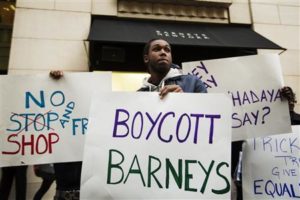
The settlement was prompted by an investigation conducted by the office of New York state attorney general Eric T. Schneiderman, which reviewed the internal “loss prevention” procedures employed by Macy’s at its Herald Square store as well as allegations that Black and Hispanic shoppers were unfairly targeted by security officials, according to a report in The New York Times.
In the agreement, the office found that Macy’s “detained African-Americans, Hispanics and other minorities for allegedly shoplifting at significantly higher rates relative to whites.”
“This agreement will help ensure that no one is unfairly singled out as a suspected criminal when they shop in New York,” Schneiderman said in a statement.
The settlement covers all 42 Macy’s stores in New York state.
Last week, the attorney general reached a similar agreement with Barneys New York, which agreed to make changes to address allegations of racial profiling at its Madison Avenue store.
Macy’s had already been operating under a consent decree entered in 2005, which also was designed to address allegations of racial profiling in how customers were treated. That decree expired in 2008.
At least two Macy’s sales representatives told investigators that store guards followed Black and Hispanic shoppers “at rates far greater than that of white customers,” according to the Times. Among the changes Macy’s has agreed to make are to hire an independent expert within the next three months who will be responsible for improving and monitoring its anti-shoplifting efforts over the next three years. In addition, the store will enhance its record keeping related to training and security, distribute an anti-racial-profiling memorandum to workers and drop a policy that allows guards to stop shoppers who take an item more than two floors from where they picked it up without buying it.
“Serving customers is what we are all about, and we will continue to work tirelessly to ensure that all customers feel welcome at Macy’s and are treated with respect,” the company said in a statement.
The anger over the alleged racial profiling practiced by New York department stores Barneys and Macy’s even bubbled onto the streets of Manhattan in October, as protesters shouting “no shop and frisk” picketed in front of Barneys in Manhattan.
“The disrespect that racial profiling does to us as a people will not be tolerated,” Evelyn Manns, a pastor at Brooklyn Christian Center, told the demonstrators.
At the time, both department stores shifted the blame to the New York Police Department.
“This was an operation of the New York City Police Department,” Macy’s spokeswoman Elina Kazan said in a statement.
In addition, Barneys Chief Executive Mark Lee likewise said his employees had no part in the two incidents involving Black customers.
“We believe that no Barneys employees were involved in those incidents,” Lee said after a meeting in Harlem with civil rights leader the Rev. Al Sharpton and members of his National Action Network. “No one from Barneys brought them to the attention of our internal security, and no one from Barneys reached out to external authorities.”
NYPD chief spokesman John McCarthy countered those claims, saying that in the Barneys’ incidents and the Macy’s case, officers were acting on information provided by store security.
At least four shoppers in New York stepped forward last year, publicly claiming they were racially profiled after making expensive purchases.
Art Palmer, a 56-year-old exercise trainer from Brooklyn, came forward saying that he had been surrounded by police officers after he made an expensive purchase at Macy’s flagship store.
Palmer says the incident happened in April when he purchased $320 worth of Polo dress shirts and ties.
He said he was surrounded by NYPD officers in plain clothes about three blocks away from Macy’s where he had made the purchase without problem.
Treme actor Rob Brown made the same accusations against the same Macy’s, and two other shoppers accused Barneys New York of racial profiling as well.
A 19-year-old shopper, Trayon Christian, is suing Barneys after he was detained by police officers when he purchased a $349 Salvatore Ferragamo belt back in April.
Another Barneys shopper also stepped forward. Kayla Phillips, 21, says she was accused of credit card fraud in February when she purchased a $2,500 designer bag.


